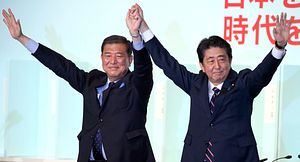On Thursday, the intra-party leadership election for the Liberal Democratic Party (LDP) proved a walk in the park for Prime Minister Shinzo Abe, who grabbed an 82 percent parliamentary majority against his only opponent, former LDP Secretary General and Defense Minister Shigeru Ishiba.
During his six years as prime minister, Abe has run a tight ship and that showed in the vote count. Abe secured over 553 votes from loyal lawmakers in the diet compared to Ishiba’s 254 votes. But outside Tokyo Abe’s appeal is less entrenched, with rank-and-file party votes in regional areas giving Ishiba 45 percent of votes and Abe 55 percent.
Abe’s decision to enter the LDP presidential race defied expert predictions from earlier this year. Some analysts had tipped the prime minister would resign by June after two separate cronyism scandals saw his public approval rating plummet to an all-time low, raising questions over the damage Abe could bring to the LDP’s chances in the upper house elections next summer.
For from resigning, however, Abe’s historic win puts him on track to become Japan’s longest serving prime minister. His third consecutive term will be the last, as LDP rules bar a fourth term. That puts Abe in a position to focus on the kind of legacy he will leave behind and how to pursue his vision of Japan over the next three years in power.
During the two week campaign period, Ishiba brought to the surface intra-party tensions over the current political style of economic policy and party management. Abe and Ishiba butted heads over “Abenomics,” which Ishiba criticized for neglecting small- to medium-sized businesses in rural areas. He argued that rural areas never seem to get richer despite big cities prospering. While calling for a review of Abenomics, Ishiba said the revenue from large companies doesn’t trickle down to the agriculture, forestry, and fisheries sectors and urged more support for developing small business in rural areas.
Meanwhile, a key component of Abenomics is pushing forward a 10 percent sales tax hike, scheduled in October next year, to help reform Japan’s buckling social security system in the face of an aging population and mounting national debt. With social security expenses expected to double by 2040, young people and future generations could face overwhelming premiums and an unfair share of tax burdens. Ishiba proposed a new national council on social security to open public discussion rather than having the Abe administration push back consumption tax rises to avoid talking about what to do next.
It’s no secret that Abe’s dream of revising the war-renouncing Article 9 of the Japanese Constitution is at the top of his domestic agenda. He said the LDP presidential results are an “encouraging message” to push through with a risky national referendum in the upper house next year, though the LDP doesn’t have the majority needed to guarantee such a measure will pass without forming a coalition with the Komeito party. In response, Ishiba argued that constitutional revision was not an urgent priority and shouldn’t be pushed without sincere efforts for it to be understood by the people. Instead, Abe’s sole challenger argued that priority should be given to eliminating depopulated electoral districts from the upper house.
Following his defeat, Ishiba said he was staying put in his post, and alluded to running for the LDP presidency again, saying “no administration lasts forever.” He appeared upbeat from his better-than-expected results in regional areas, saying “almost half of the party voted for me,” which would “naturally bring about some change.” No doubt Ishiba’s growing influence within the party will raise pressure and challenge Abe’s unchallenged policy approach.
Abe has remained tight-lipped over his plans for a cabinet reshuffle as he heads to a UN General Assembly meeting in New York, only promising to choose “the right people in the right place.” But eyebrows are being raised as to whether Abe’s ally and long-term friend, Finance Minister and Vice President Taro Aso, will regain his post despite a sexual harassment scandal embroiling a senior public servant under Aso’s watch. Abe maintains Aso is the only person qualified to “rehabilitate the Finance Ministry and push forward our financial policies.”
However, a senior government official speaking to Kyodo News speculated that Abe intends to retain all his big-name cabinet ministers, except for Ishiba-affiliated ministers. Hereafter, all eyes will be on how Abe will treat diet members who showed support to Ishiba in the LDP elections. Will a priority will be placed on maintaining intra-party harmony by embracing minority voices or suppressing them?

































